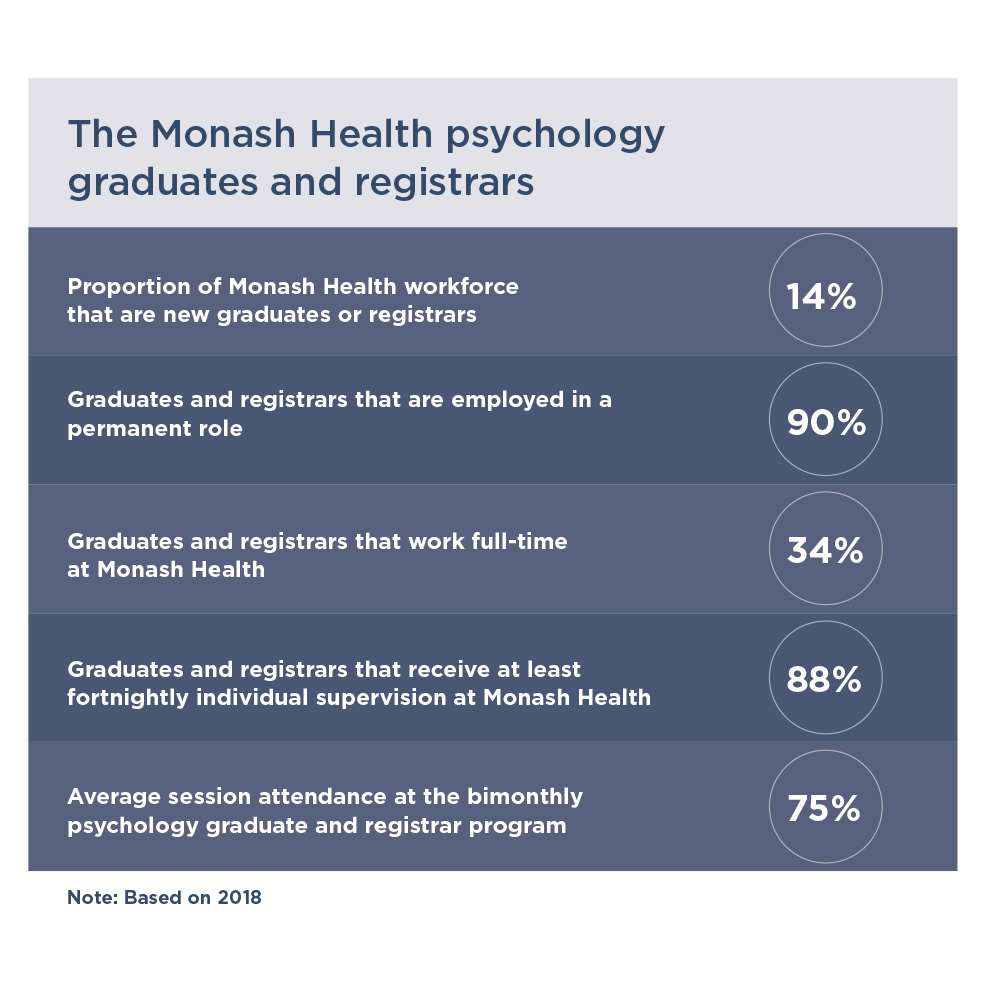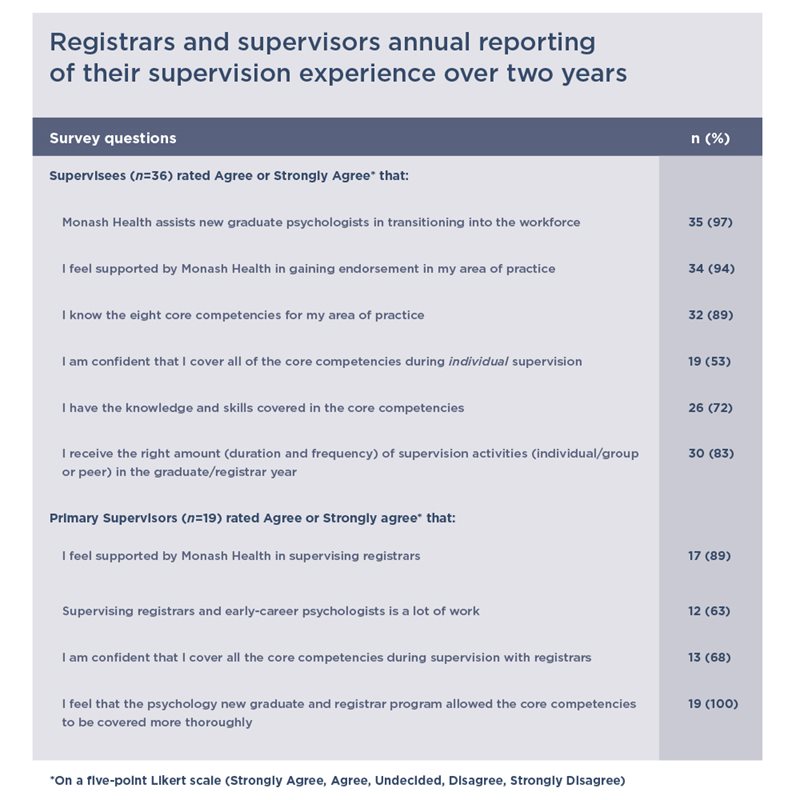The Monash Health psychology graduate and registrar program
Transition from a psychology postgraduate degree to the health workforce represents a steep learning curve, and early-career psychologists face many challenges during this period. Ongoing education and training is important to facilitate the continual professional developmental needs of early-career psychologists, and should emphasise progress and be creative in its approach to allow these psychologists to flourish (Kaslow et al., 2018).
While many early-career psychologists registered as general psychologists want to participate in the psychology registrar program, they report barriers to accessing this program and its requirements. These range from limited access to supervision and inability to meet the clinical hours (e.g., if working part-time), to difficulties meeting all the core competencies (Connellan, 2016). This article describes an innovative and successful group supervision program led by psychologists, and implemented within an education and training framework in a public health setting.
There are 170 psychologists employed at Monash Health in Victoria, providing healthcare across primary, secondary and tertiary health services. Fourteen per cent are early-career psychologists (graduates; i.e. graduating in the past year) or undertaking a psychology registrar program to gain Psychology Board of Australia (PsyBA) endorsement (registrars).
The program commenced in March 2017. Funding provided by the Victorian Government Department of Health and Human Services Early Career Graduate support grant (DHHS, 2017–2018) was used to employ a coordinator for the development and implementation of the psychology graduate and registrar group program. The coordinator, a registered psychologist, is the group facilitator and is registered as a secondary supervisor with the Australian Health Practitioner Regulation Agency (AHPRA) for each registrar, thereby enabling the registrar to count session attendance towards the registrar’s supervision hours.
The group aims to provide a forum in which psychologists can access supervision, build on their skills and knowledge, and assist them with the transition into being a working professional in the public health setting. Group sessions run for two hours every two months, with six sessions offered throughout the year. Session content focuses on one of the eight core competencies required by the PsyBA (2019), and supervisee commitment includes pre-reading material, case presentation, self-reflection and group discussion. Group supervision is in addition to the primary supervision arrangements in place.

Program outcomes
The outcome data is encouraging. Attendance rates are high and managers across programs are supportive of their psychologists allowing them to attend sessions, which are often offsite.
Session evaluations are completed anonymously at the end of each group session. The evaluations show that the content is relevant to their professional learning needs. The participant’s rate making new connections with other early-career psychologists highly, and as well as the quality of interaction within the group, the registrars also reported acquiring knowledge impacting on their work and professional behaviour. Separate to this, we surveyed the registrars and their primary supervisors anonymously and annually in more detail about their overall feelings about the group and the health service in which they work.
Compared with baseline reports (pre-group attendance) supervisors confidence in covering the core competencies rose slightly from 58 per cent (n=26) to 68 per cent and they felt that the work required in supervising early-career psychologists reduced from 72 per cent to 63 per cent following group attendance. Respondents were also asked “What were the benefits of the psychology graduate and registrar program for you?” Graduates and registrars reported that they enjoyed the opportunity to meet other graduates, making new connections, understanding the core competencies more and that the program allowed them to share (common) experiences.
The opportunity for time to self-reflect and hear other’s experiences was highly valued. Qualitatively, primary supervisors also felt confident in knowing that their supervisees were accessing supervision that covered the core competencies, especially if their clinical role did not offer all aspects of the competencies (e.g., working across the lifespan).
Challenges and successes
Some challenges to the group include it being an open group, such that individuals enter and leave at different times of the year, and that the group continues to grow in size potentially impacting on the group dynamic and facilitator’s ability to maintain collaboration, structure, and process. Due to the increasing size of the group over the past two years and projected numbers, two parallel groups are now running.
The success of the group is attributed to manager support, collaboration with the psychology leadership and education units, regular consumer feedback, and ongoing funding to allow the continuation of a single and consistent person to facilitate the sessions. At a systems level, Monash Health has guidelines for the provision of regular, structured supervision and more intensively for those wishing to do the registrar program (i.e. more frequent primary supervision plus secondary group supervision). Most Monash Health registrars are employed in a permanent ongoing position, creating stability and reassurance that we can support them throughout the early stages of their career. At an individual level, group facilitator tips include but are not limited to the following:
- being organised
- making learning fun
- providing a safe space to reflect on cases and professional scenarios
- not underestimating the positive ‘group effect’ on learning.
Facilitator reflection and formal training on running small groups is also recommended, along with an openness to continued learning.
We have shown that establishing a structured competency-based group supervision program that meets the learning needs of early-career psychologists, including registrars, is possible. Outcomes from the Monash Health group are positive overall with these psychologists reporting high satisfaction with group sessions, stating that they acquire new knowledge, peer support and time to reflect on the nature of the work they are doing. We recognise this as a platform for continual professional learning for new psychology staff, and data suggests a promising model for delivering supervision to early-career psychologists.
 The program shows benefits to psychology registrars and also for employers in relation to recruitment and retention of an increasingly requested workforce. Replicability of the program in other public health and private sector services is a consideration. Further research into the outcomes of the program and the experience of registrars more broadly is now in progress.
The program shows benefits to psychology registrars and also for employers in relation to recruitment and retention of an increasingly requested workforce. Replicability of the program in other public health and private sector services is a consideration. Further research into the outcomes of the program and the experience of registrars more broadly is now in progress.
The first author can be contacted at: [email protected]
Acknowledgements
The authors thank the following staff in the establishment of the psychology group program and session content: Dr Melanie Farlie, Elizabeth Batchelor, and Emily Johnson, and the Workforce, Innovation, Strategy, Education and Research Unit at Monash Health.